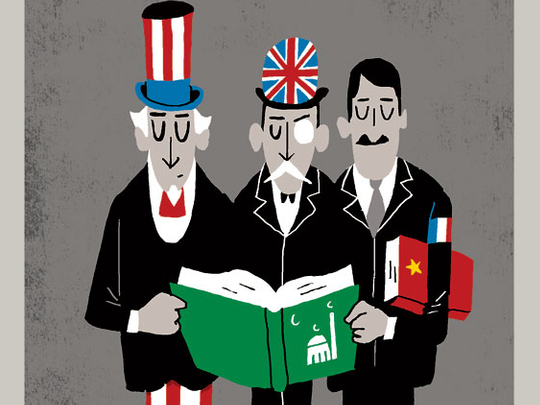
It was never likely that Michele Bachmann would simply go away.
Bachmann is the Minnesota Congresswoman and former presidential candidate who once called for investigations of “un-American” activities by her fellow members of Congress and denounced the vaccination of children because, she said, a voter told her that it led to mental retardation. Last week, she was back in the news, turning her attention to the loyalty of Muslim Americans.
In a letter to the State Department’s inspector general, Bachmann and four other right-wing Republicans called for an investigation into the background and loyalty of Huma Abedin, a senior aide to Hillary Clinton.
The letter charges that Abedin “has three family members — her late father, her mother and her brother — connected to Muslim Brotherhood operatives and/or organisations”.
It does not detail what exactly these “connections” are or how Abedin might represent a threat beyond the fact that she works for Clinton. It does assert that the Muslim Brotherhood is bent on “destroying Western civilisation from within”. This, it says, is part of a broader effort to promote “the totalitarian, supremacist Islamic doctrine known as sharia”.
Americans have a word for this sort of thing: McCarthyism.
The term refers to Joseph McCarthy, a Republican senator from Wisconsin who had terrified Washington, and much of the rest of the country, during the 1950s.
McCarthy became famous for denouncing people as Communists. He often claimed to have evidence of his targets’ disloyalty, but never seemed to be able to show it to anyone. It hardly mattered. In the climate of the time, the mere hint of some association with Communism was enough to destroy lives and careers, something McCarthy did with increasingly reckless abandon until he was censured by the Senate in 1954.
McCarthy himself died less than two-and-a-half years later, but his name has lived on in American politics as an epithet. To accuse someone of “McCarthyism” is American shorthand for demagoguery; in particular, demagoguery involving unsubstantiated charges and guilt-by-association.
In modern America, accusations of McCarthyism are, like many political epithets, thrown around entirely too freely. The Bachmann letter, however, fits the definition perfectly. Her charges are sweeping, but she offers no evidence beyond a vague belief that Islam, Sharia and the Muslim Brotherhood are bad for America and that Abedin is in some vague way “connected” to these things.
At one level, all of this is unsurprising. Many Americans, especially on the political right, have been looking for an over-arching demon to replace the Soviet Bloc ever since the fall of Communism. In the years since 9/11, some, mainly but not exclusively, on the right, believe they have found their new nemesis in political Islam.
One of the more curious aspects of this mindset is its insistence that the only way to deal with resurgent Islam is to avoid all nonmilitary contact with it. This completely ignores the reality of the situation developing around the Middle East: Brotherhood-affiliated parties and Islamists of other stripes are ascendant throughout the region. How (and, in some cases, whether) they will govern mostly remains to be seen, but no responsible western leader can deny that they are there.
It is, however, the purported evidence of wrongdoing in Bachmann’s letter that is, in many ways, its most troubling aspect. It details a number of administration efforts to learn more about the Brotherhood and its view of the world through contact with Brotherhood leaders. It says, in effect, that all of these are little better than falling into a trap the Brotherhood has laid for unsuspecting American government officials as part of its larger programme of “civilisation jihad”.
Washington, London and Paris are all going to have to learn to live with the Islamists (as, it is worth remembering, they all learned to live with Communism — even at the depths of the McCarthy period, the US maintained normal diplomatic relations with the Soviet Union).
That being the case, the sooner they figure out how to talk to the Brotherhood and its offshoots, the better off all will be. Talking, in turn, means moving beyond witch-hunts, like the one launched by Bachmann and her allies.
It is worth noting that a lot of people stood up for Abedin last week, including senior Republicans such as John McCain. That was reassuring, but the next person to be attacked like this is unlikely to be so lucky in terms of either their friends or those friends’ willingness to defend them.
Neither wall-building nor witch-hunts will make the Islamists go away. The sooner the Islamophobes come to understand that, the better off we all will be — Arabs and Americans alike.
Gordon Robison, a longtime Middle East journalist and US political analyst, teaches political science at the University of Vermont.










